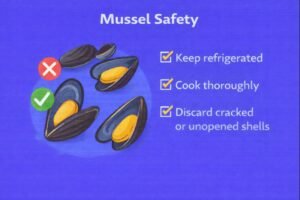Mussel Food Safety: First Aid Awareness and Safe Handling in Canada
What Are Mussels?
Mussels are a type of edible shellfish commonly enjoyed steamed, boiled, or added to soups and pasta dishes. They are valued for nutrients such as vitamin B12 and omega-3 fatty acids. Like all seafood, mussels must be handled and cooked carefully because they can spoil quickly or carry contaminants if sourced or stored improperly.
Why Mussel Safety Awareness Matters in Canadian Homes and Workplaces
In Canada, mussels are popular in restaurants, community events, and home kitchens—especially in coastal regions. First aid awareness focuses on recognizing signs of food spoilage, practising safe food handling, and knowing early symptoms of food-borne illness, rather than diagnosing disease. Clean preparation surfaces, proper refrigeration, and reliable sourcing are key habits.
A Simple, Realistic Scenario
A family prepares steamed mussels for dinner and notices several shells remain closed after cooking. Remembering basic food-safety guidance, they discard those mussels and refrigerate leftovers promptly. No one develops stomach upset the next day.
Common Food-Borne Symptoms to Watch For

-
Nausea or vomiting
-
Fever or chills
-
Fatigue or general weakness
-
Signs of dehydration such as dry mouth or dizziness
Many mild cases improve with rest and fluids, but persistent or worsening symptoms should be checked further.
Potential Sources of Contamination
Water Quality
Mussels filter large amounts of water as they feed. If harvested from polluted areas, they may accumulate bacteria, viruses, or chemical residues. Buying from reputable suppliers and approved harvesting zones helps reduce risk.
Viruses and Bacteria
Shellfish can occasionally carry microorganisms that affect the digestive or respiratory systems. Proper cooking and avoiding raw or undercooked shellfish lowers exposure.
Heavy Metals and Chemicals
Environmental pollutants—such as lead, mercury, or industrial runoff—can build up in some coastal areas. Regulatory monitoring and certified suppliers are important safeguards.
Parasites
Certain parasites can affect the gastrointestinal tract if shellfish are consumed raw or insufficiently cooked. Thorough cooking significantly reduces this risk.
First Aid Awareness and General Supportive Measures
From a public-education perspective, the emphasis is on hydration, rest, and hygiene if stomach upset occurs:
-
Encourage small, frequent sips of clean water or oral rehydration fluids
-
Rest and avoid strenuous activity while unwell
-
Wash hands thoroughly after washroom use and before food preparation
-
Clean kitchen surfaces, utensils, and cutting boards
-
Avoid preparing food for others until symptoms clearly improve
-
Monitor for ongoing fever, weakness, or dehydration signs
First aid awareness supports comfort and cleanliness rather than medical treatment.
Safe Handling and Prevention Tips in Canada
-
Purchase mussels from reputable seafood vendors or certified markets
-
Keep shellfish refrigerated and cook soon after purchase
-
Discard mussels with cracked shells or those that do not open after cooking
-
Avoid cross-contamination with raw meats or unwashed produce
-
Cook shellfish thoroughly and reheat leftovers fully
-
Follow local public-health advisories for shellfish harvesting areas
These steps help reduce the likelihood of food-borne illness in homes, restaurants, and community kitchens.
Frequently Asked Questions About Mussel Safety
Can mussels be eaten raw?
Raw shellfish carry higher food-safety risk. Thorough cooking is generally safer.
Why discard unopened shells after cooking?
Unopened shells may indicate spoilage or that the mussel was not safe to eat.
How quickly should mussels be refrigerated?
As soon as possible after purchase or cooking to maintain freshness.
Do all coastal areas have the same safety level?
No. Water quality and monitoring programs vary by location.
When should stomach symptoms be checked further?
If vomiting or diarrhea persists, fever continues, or dehydration signs appear, further assessment is advisable.
Educational Note
This article is intended for general public and workplace education in Canada. It supports seafood-safety awareness and first aid recognition but does not replace evaluation or care from qualified healthcare professionals.
